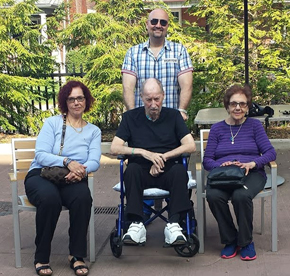‘I knew I could lose my dad’ — The serious impact of the flu

By Amber Daugherty

Umberto Leone and his family
Umberto Leone knows all too well the dangers of the flu. When his father was diagnosed at the beginning of 2017, it set off a devastating chain of events leading to nine months in hospital – including almost two in the Intensive Care Unit.
“My father was a healthy guy who walked daily and drove himself around,” Leone said. “Now he’s on first floor living, has heart failure, has to be careful what he eats – his whole life has changed.”
Leone’s father – Michele – was diagnosed with influenza at 81 years old. After trying to ride it out at home with fluids and rest, he started to get worse, which prompted an emergency visit to the hospital where he was admitted to the ICU. He was there for 48 days.
“He was intubated three times and put on life support,” Leone said. “He also entered a state of a comatose-like catatonic stupor, suffered two bacterial pneumonias, sepsis and more. Everything came to a grinding halt – I knew I could lose my dad.”
Flu can often weaken the body and make it more susceptible to other infections and complications, including pneumonia and respiratory failure. It can cause severe issues for high-risk groups including babies, pregnant women and the elderly. Every year, it causes more than 12,200 hospitalizations and 3,500 deaths across Canada.
“Unfortunately, many people don’t take the flu as seriously as they should,” said Dr. Mark Downing, infection control officer at St. Joseph’s. “The risks are so high, especially when there’s a free option available that can help keep people healthy – the flu shot.”
Many myths exist about the vaccine, including that it doesn’t really do anything or it might make people sick – all of which are far from the truth, Dr. Downing says.
“The flu shot isn’t 100 per cent effective but it will help protect you, which is better than no protection at all,” he said. “And side effects from the vaccine are rare – it uses an inactivated virus which means it can’t cause the flu. There’s more than one virus circulating in the winter so if you do get sick, it could be that the vaccine protected you from the flu – often the more serious infection – but you got rhinovirus or something else.”
Leone’s father is now back home and, like always, will be getting his flu shot again this winter. This year, a special high dose vaccine is available for those 65 years and older to add extra protection.
“The flu isn’t just a bad cold,” Leone said. “It’s a virus that can lead to a complete shutdown and if you’re lucky you’ll make it out with hopefully minimal changes to your quality of life. The problem is that a lot of elderly people who get it don’t make it out of the hospital at all. I’m grateful to St. Joe’s and all of the staff there who took such good care of my dad – we’re happy to have him back home.”
About St. Michael’s Hospital
St. Michael’s Hospital provides compassionate care to all who enter its doors. The hospital also provides outstanding medical education to future health care professionals in more than 29 academic disciplines. Critical care and trauma, heart disease, neurosurgery, diabetes, cancer care, care of the homeless and global health are among the Hospital’s recognized areas of expertise. Through the Keenan Research Centre and the Li Ka Shing International Healthcare Education Centre, which make up the Li Ka Shing Knowledge Institute, research and education at St. Michael’s Hospital are recognized and make an impact around the world. Founded in 1892, the hospital is fully affiliated with the University of Toronto.
St. Michael’s Hospital with Providence Healthcare and St. Joseph’s Health Centre now operate under one corporate entity as of August 1, 2017. United, the three organizations serve patients, residents and clients across the full spectrum of care, spanning primary care, secondary community care, tertiary and quaternary care services to post-acute through rehabilitation, palliative care and long-term care, while investing in world-class research and education.
